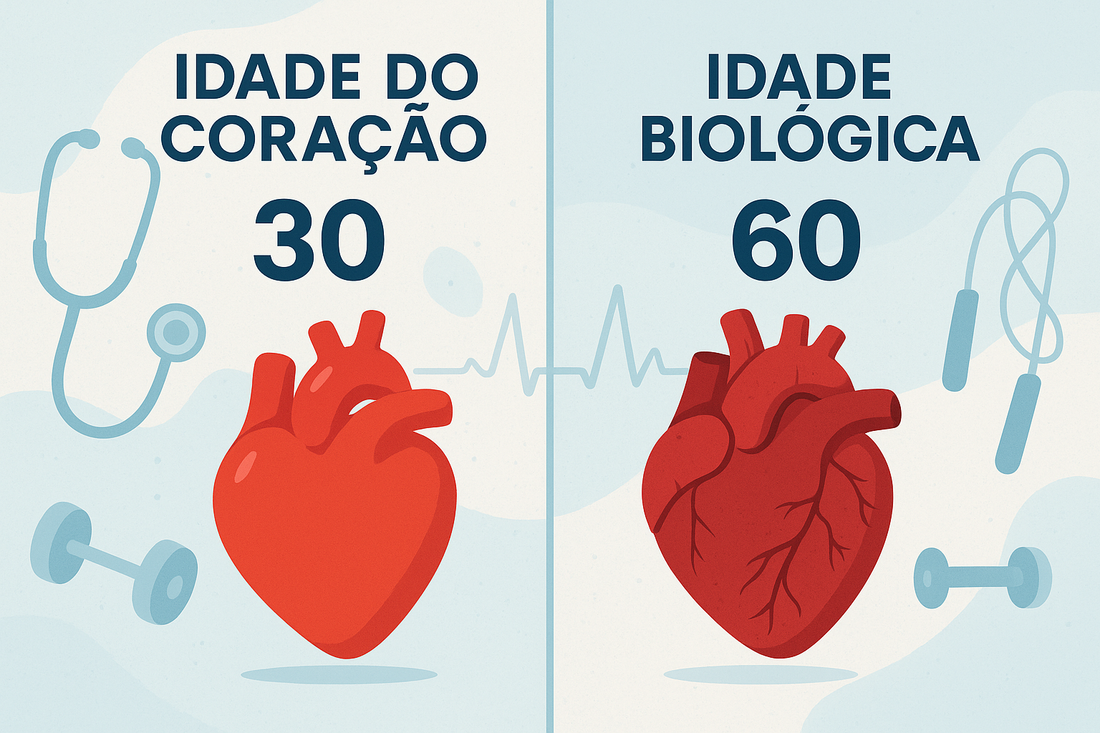
Want to know if your heart is older than your biological age? Take the test
Share
Did you know that your heart health may not reflect your biological age? Factors like diet, exercise, stress, and even your daily habits can influence your heart's "age." In this article, we'll explain how to assess your cardiovascular health and share a simple test you can do at home to find out if your heart is in good shape or needs more attention.

What is heart age?
Heart age is an estimate of the health of your cardiovascular system, compared to your chronological age. For example, a 40-year-old person may have a heart that's "aged" at 50 due to risk factors such as high cholesterol, a sedentary lifestyle, or smoking. On the other hand, a healthy lifestyle can keep your heart younger than your actual age.
Why is it important to know your heart age?
Knowing your heart's age helps identify cardiovascular risks early. Diseases such as hypertension, atherosclerosis, and heart attacks can be prevented with lifestyle changes. Taking this test is the first step toward becoming aware of your health and taking action before it's too late.
Simple test to assess your heart health
This test, adapted for the Home Workout audience, is not a substitute for a medical consultation, but it can give you a general idea of your heart health. Answer the questions below and add up the points to get your result.
Test questions
-
What is your chronological age?
-
Under 30 years old: 0 points
-
30 to 39 years old: 1 point
-
40 to 49 years old: 2 points
-
50 years or older: 3 points
-
-
Do you exercise regularly? (at least 150 minutes per week of moderate activity, such as brisk walking)
-
Yes: -2 points
-
No: +2 points
-
-
Do you smoke or have you ever smoked regularly?
-
Never smoked: -1 point
-
Ex-smoker (quit more than 1 year ago): 0 points
-
Current smoker or quit less than 1 year ago: +3 points
-
-
How is your weight? (Calculate your BMI: weight in kg ÷ height in meters squared)
-
BMI below 25: -1 point
-
BMI between 25 and 29.9: +1 point
-
BMI 30 or higher: +3 points
-
-
Do you have a family history of cardiovascular disease? (heart attack, stroke, or hypertension before age 60 in first-degree relatives)
-
No: 0 points
-
Yes: +2 points
-
-
What is your diet like?
-
Rich in fruits, vegetables, whole grains and healthy fats: -2 points
-
Unbalanced diet, rich in saturated fats, sugar or salt: +2 points
-
-
Do you experience chronic stress or have difficulty managing stress?
-
No, I can manage stress well: -1 point
-
Yes, I often feel stressed: +2 points
-
How to calculate the result
Add up the points for your answers. The total will indicate the approximate "age" of your heart in relation to your biological age:
-
Less than 0 points : Your heart is younger than your age! Keep up the good habits.
-
0 to 3 points : Your heart is roughly the same age as you. There may be room for improvement in some habits.
-
4 to 7 points : Your heart may be a little older than your age. Consider making lifestyle changes.
-
8 points or more : Warning! Your heart may be significantly older. Consult a doctor for a more detailed evaluation.
Tips to keep your heart young
If your test results indicate that your heart needs attention, don't despair! Small changes can make a big difference. Here are some practical suggestions for your daily routine, perfect for those who follow Home Workout :
-
Move more : Try our cardio workout routines, like HIIT or brisk walking, available on the Home Workout website.
-
Eat better : Include more vegetables, fruits, and healthy fats (like olive oil or avocado) in your diet. Cut down on salt and processed foods.
-
Managing stress : Practice breathing exercises or yoga, available in our guided videos.
-
Sleep well : Quality sleep is essential for cardiovascular recovery.
-
Get regular check-ups : Monitor your blood pressure and cholesterol with a healthcare professional.
Conclusion
Knowing your heart age is an important step toward living healthier and more energetically. This test is just a starting point—if you have any questions or the results indicate risks, consult a doctor for more accurate tests, such as blood pressure or cholesterol testing.
At Home Workout , we're here to help you take care of your heart with accessible workouts and practical tips. Try it, share your results in the comments section of our community, and start taking better care of yourself today!


